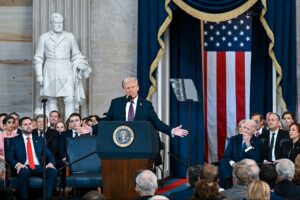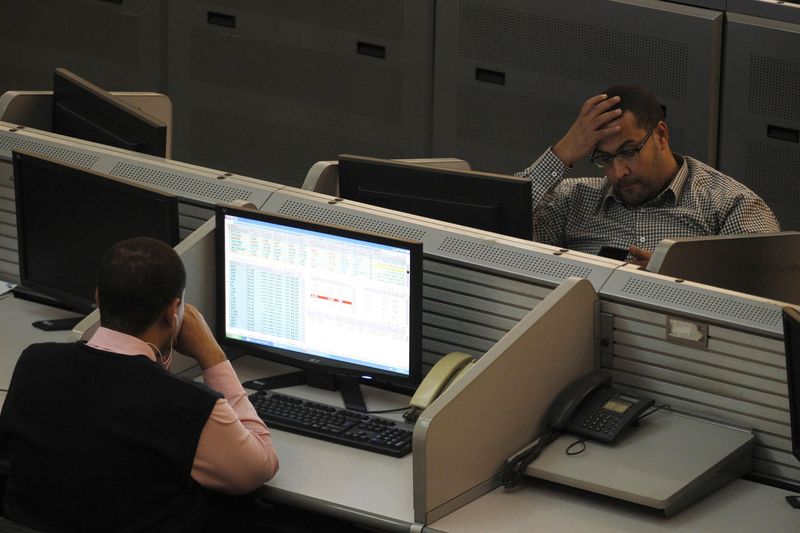© Reuters.
(This March 14 story has been refiled to correct the spelling of Cleveland-Cliffs (NYSE:) CEO Lourenco Goncalves’ surname in paragraph 9)
By Trevor Hunnicutt and Alexandra Alper
WASHINGTON (Reuters) – U.S. Steel Corp, which has agreed to be bought by Japan’s Nippon Steel for $14.9 billion, must remain a domestically owned American firm, President Joe Biden said on Thursday – expressing explicit opposition to the deal for the first time.
“U.S. Steel has been an iconic American steel company for more than a century, and it is vital for it to remain an American steel company that is domestically owned and operated,” the president said in a statement.
It was, however, not immediately clear whether Biden would use any U.S regulatory authorities to scuttle the deal. The Committee on Foreign Investment in the United States (CFIUS), a powerful panel that reviews foreign investments in U.S. companies, has the power to recommend the deal be blocked on national security grounds.
The White House said in December that the proposed acquisition deserved “serious scrutiny” given U.S. Steel’s core role in steel production that is critical to national security.
Nippon Steel said in a statement on Thursday that the acquisition would deliver “clear benefits to U.S. Steel, union workers, the broader American steel industry, and American national security.”
“We are progressing through the regulatory review, including CFIUS, while trusting the rule-of-law, objectivity, and due process we expect from the U.S. Government. We are determined to see this through and complete the transaction,” it said.
The Japanese firm also said in an initial statement that there would be no layoffs and no plant closures until September 2026 under certain conditions but later re-issued its statement to say there would be no layoffs or plant closures as a result of the transaction.
Shares of U.S. Steel sank again on Thursday and have tumbled 18% over two days to $38.26 on concerns that Biden would express his opposition. That’s far below the proposed deal price of $55 per share. The company was not immediately available for comment.
Separately, Cleveland-Cliffs CEO Lourenco Goncalves said on Thursday he would consider another bid for United States Steel (NYSE:) likely worth no more than $30 per share if the deal with Nippon Steel falls apart.
Cleveland-Cliffs was among the bidders for U.S. Steel.
U.S. opposition to the deal has the potential to overshadow an April 10 summit between Biden and Japanese Prime Minister Fumio Kishida aimed at boosting the long-standing security alliance between their countries in the face of growing Chinese influence.
Biden, who is running for re-election this year and has courted unions as a key constituent of political support, also called United Steelworkers International President David McCall on Thursday. He reiterated that he has the “steelworkers’ back,” the White House said.
McCall said Biden’s statements should end debate about the deal.
“Allowing one of our nation’s largest steel manufacturers to be purchased by a foreign-owned corporation leaves us vulnerable when it comes to meeting both our defense and critical infrastructure needs,” he said in a statement.
CFIUS has met with the parties to discuss the deal, a person familiar with the matter said.
The Treasury Department, which leads CFIUS, did not immediately respond to a request for comment, and the White House declined to comment on whether Biden planned to use its powers to block the deal.
According to a January filing, Nippon Steel has committed to undertaking “all actions required” to obtain CFIUS clearance and to pay U.S. Steel a $565 million breakup fee if it fails to do so.
Art Hogan, chief market strategist at B Riley Wealth in New York, said there were always complications when foreign companies look to buy U.S.-based corporations but Nippon Steel had an uphill battle in particular due to timing.
“In an election year, it will be a heavy lift to get all the stakeholders comfortable with the acquisition of a U.S. manufacturing icon,” Hogan added.
Read the full article here












